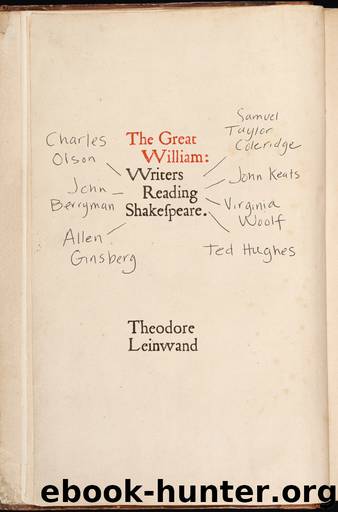The Great William: Writers Reading Shakespeare by Theodore Leinwand

Author:Theodore Leinwand [Leinwand, Theodore]
Language: eng
Format: epub
ISBN: 9780226367699
Publisher: The University of Chicago Press
Published: 2016-04-12T16:00:00+00:00
Twenty-five years prior to this, in March 1946, a laboring, accumulating, possibly hysterical or manic Berryman wrote to Van Doren that he had just “collated 24 copies of the First Folio [King Lear] in Washington . . . and am only just able to see my hand in front of my face, ha ha” (BS, 242). Given that no Berryman edition of King Lear and no Berryman life of Shakespeare ever came to fruition, his scrupulous if comically parenthetical “provided they ever get done” can only have been tendered as half-grudging grist for Van Doren’s mill.11 And yet, Berryman’s lifelong commitment to manure and to dust, to “everything,” was more consequential than even Van Doren could see.
Thanks to Van Doren’s last-minute rescue effort, Berryman was able to move from Columbia College to Cambridge University as the Kellett Fellow for 1936–38. His English tutor, George (“Dadie”) Rylands, was an accomplished actor, a director (who inspired Peter Hall, John Barton, and Trevor Nunn), and Virginia Woolf’s host at the King’s College luncheon described in A Room of One’s Own. Berryman would not have been alone in judging him “one of the 3 or 4 most acute critics of the 1930s of Shakespeare’s poetry & style” (BS, xii).12 “He was kind to me stranded,” writes Berryman in “Transit”; “even to an evening party / he invited me, where Keynes & Auden / sat on the floor in the hubbub trading stories” (CP, 197). Although in 1937 he protested that “It’s awfully silly . . . ever to do anything but read Shakespeare—particularly when we’ve only one lifetime” (Life, 85), Berryman read very widely while abroad (from Chaucer to Yeats, from Ronsard to Rimbaud). He was nearly always composing poems, and occasionally publishing them (Robert Penn Warren took five for The Southern Review; Eliot rejected what he sent to him at The Criterion). He drank with Dylan Thomas and he sipped tea with Yeats. He took in plays (including Olivier’s “unbelievably bad” Hamlet and his “damn bad” Macbeth) and then tried his hand at writing them. Working on his one-act Cleopatra: A Meditation, Berryman let on as how “Shakespeare was magnificent (and wrong), I hope to be interesting as well as right” (Life, 92). It was while he was at Cambridge that Berryman first announced that he was “very anxious to edit Lear . . . no edition worth drains exists.”13
His Shakespearean through-line would extend to the Harness Essay Prize, which he did not win but for which he wrote more than seventy pages on “The Character and Role of the Heroine in Shakespearian Comedy,” and to the prestigious and remunerative Charles Oldham Shakespeare Prize, which he won in 1937. In the course of preparing for his prize essays, he worked his way through Folio facsimiles and “such Quartos as I have, the Cambridge 1863–6, some Furness volumes, some Arden, the erratic New Sh as far as it goes, . . . Johnson, Richardson, Hazlitt (hell take him), Coleridge, Bradley, Greg.”14 And so it went.
Download
This site does not store any files on its server. We only index and link to content provided by other sites. Please contact the content providers to delete copyright contents if any and email us, we'll remove relevant links or contents immediately.
Cecilia; Or, Memoirs of an Heiress — Volume 2 by Fanny Burney(31931)
Cecilia; Or, Memoirs of an Heiress — Volume 3 by Fanny Burney(31923)
Dialogue by Robert McKee(4380)
The 101 Dalmatians by Dodie Smith(3500)
Bound by Hatred (The Singham Bloodlines Book 2) by MV Kasi(3065)
The Art of Dramatic Writing: Its Basis in the Creative Interpretation of Human Motives by Egri Lajos(3055)
Harry Potter and the Cursed Child - Parts One and Two by John Tiffany(3024)
The Beautiful Boys: A High School NA Reverse Harem Paranormal Bully Romance (Shadowlight Academy Book 1) by Gow Kailin(2850)
Angels in America by Tony Kushner(2641)
Carrie's War by Nina Bawden(2462)
A Clockwork Orange by Anthony Burgess(2455)
Unlaced by Jaci Burton & Jasmine Haynes & Joey W. Hill & Denise Rossetti(2359)
The Femme Playlist & I Cannot Lie to the Stars That Made Me by Catherine Hernandez(2278)
Open Book by Jessica Simpson(2257)
Drama by John Lithgow(2226)
Outside Woman (BWWM Amish Romance) by Stacy-Deanne(2102)
Terrorist Cop by Mordecai Dzikansky & ROBERT SLATER(2066)
Yerma by Federico García Lorca(2061)
Leo's Desire by Sundari Venkatraman(1925)
